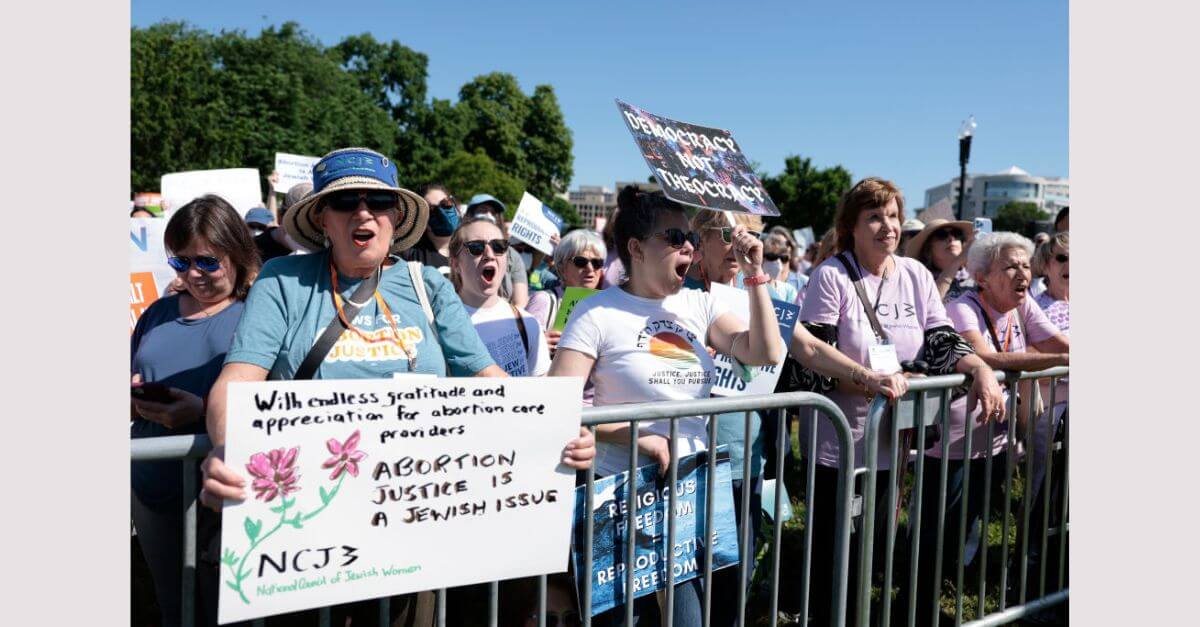How the Jewish commandment to ‘be fruitful and multiply’ could help a woman challenge Kentucky’s abortion ban in court
Jessica Kalb argues she could be prosecuted under the state’s abortion law for receiving IVF treatment

Protesters at the “Jewish Rally for Abortion Justice” rally in 2022 in Washington, D.C. Photo by Anna Moneymaker/Getty Images
A Kentucky state judge partially reversed a prior decision that blocked three Jewish women from challenging the state’s near-total abortion ban on religious liberty grounds, ruling Friday that one woman can proceed with the case.
The lawsuit, first filed in 2022, argues that Kentucky’s abortion law prevents the women from fulfilling the Jewish commandment to “be fruitful and multiply” because of how the ban could affect their ability to pursue in vitro fertilization, or IVF.
Kentucky bans abortion except to protect the health or life of the mother, with no exceptions for rape or incest. The women who filed suit argue that the law could lead them to be criminally prosecuted for the destruction of any unviable or unused embryos, making them fearful of receiving fertility treatment.
“The fact that lawmakers who don’t understand healthcare or my religious beliefs have more rights to my body than I do is sickening,” Kalb told the local news site Kentucky Lantern.
Kentucky’s attorney general has said that the state’s abortion laws do not affect IVF or the disposing of unused embryos. Critics say Kentucky’s “Human Life Protection Act,” which makes it a felony for anyone to intentionally cause the death of an “unborn human being,” does not make that clear.
A judge tossed out the Jewish women’s suit in 2024, writing that the women did not have standing because none of them were actively undergoing IVF, and their injuries were “too speculative.” Now, Judge Brian C. Edwards of the state’s Court of Appeals has reversed that decision, arguing that Jessica Kalb has standing because she has frozen embryos.
“Ms. Kalb is paying money to keep the embryos frozen,” Judge Edwards wrote. “Should she continue to do so in perpetuity because the government will not clarify what she can and can’t do with them? No.”
In the suit, the women also cited Jewish teachings about prioritizing the life of a mother over the life of a fetus and the idea that life begins at birth, not conception.
Other Jewish efforts to challenge abortion bans on religious liberty grounds have yielded mixed results.
A 2024 Indiana court ruling required an exception to the state’s abortion restrictions for women with a sincere religious objection, after Hoosier Jews for Choice filed suit.
In Missouri, a judge upheld the state’s abortion ban after a group of interfaith clergy sued on religious grounds. In Florida, Jewish efforts to challenge the state’s six-week abortion ban fizzled out after Rabbi Barry Silver — who filed a lawsuit on behalf of his synagogue against the ban — died from colon cancer in 2024.
A court date to rule on the merits of the Kentucky case has not yet been set.














